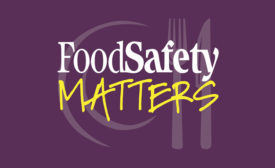Foodservice/Retail
Foodservice and retail encompasses restaurants, catering operations, supermarket chains and grocery stores, convenience stores, farmer's markets, and e-commerce and "meal kit" businesses.
ARTICLES
Never miss the latest news and trends driving the food safety industry
eNewsletter | Website | eMagazine
JOIN TODAY!Copyright ©2024. All Rights Reserved BNP Media.
Design, CMS, Hosting & Web Development :: ePublishing









